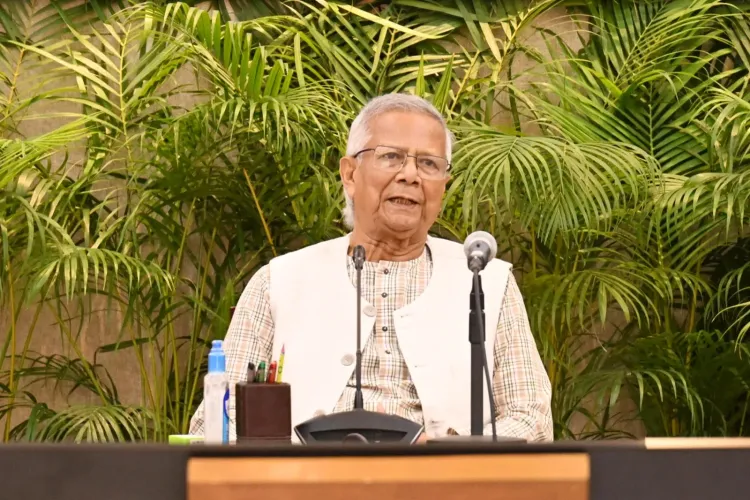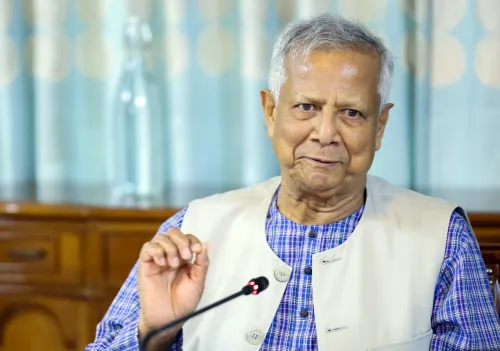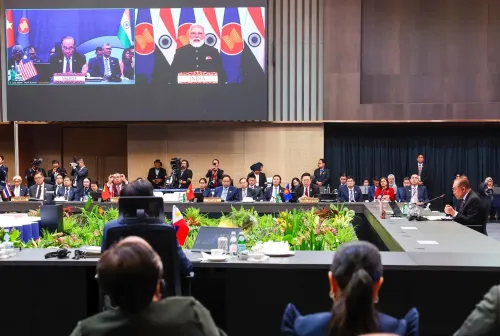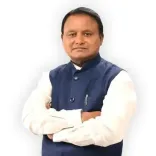Is Bangladesh's Yunus Blaming Foreign Conspiracy for Governance Issues?

Synopsis
Key Takeaways
- Political tensions are escalating in Bangladesh, prompting concerns about governance.
- The interim government led by Yunus faces accusations of foreign interference.
- Calls for a clear electoral roadmap are being made by various political parties.
- The government is committed to addressing public expectations from the July Uprising.
- Discussions among political factions aim to alleviate tensions and ensure stability.
Dhaka, May 24 (NationPress) Facing a significant political crisis following a tumultuous few months, the interim government in Bangladesh, under the leadership of Muhammad Yunus, accused "defeated forces" and a "foreign conspiracy" for obstructing a conducive environment and fostering confusion and distrust among the populace.
Yunus held a lengthy, unscheduled meeting of the Advisory Council at the Planning Commission office in Dhaka on Saturday afternoon, amidst escalating political tension and rising speculation regarding the stability and longevity of the interim government, which reportedly prompted him to consider resigning from his position as Chief Advisor.
"In spite of numerous challenges, the Interim Government remains committed to its duties, prioritizing national interests over partisan ones. However, should the performance of these responsibilities become untenable due to the instigation of defeated forces or as part of a foreign conspiracy, the government will provide the public with all necessary justifications before taking appropriate actions with the people's support," stated the Advisory Council after the meeting.
"The Council deliberated on how unreasonable demands, intentionally provocative statements, and disruptive agendas have persistently obstructed a normal operating environment, generating confusion and distrust among the public," the statement elaborated.
The Executive Committee of the National Economic Council meeting focused on three core responsibilities assigned to the interim government: elections, reforms, and justice.
"The Advisory Council asserts that greater unity is critical for ensuring national stability, facilitating free and fair elections, achieving justice, and enacting reforms, while also preventing the resurgence of authoritarianism in the nation. In this regard, the Interim Government will be receptive to the perspectives of political entities and clarify its own stance," it added.
A number of political factions, including the Bangladesh Nationalist Party (BNP) and the newly-established National Citizen Party (NCP), on Saturday called for the interim government to present a clear roadmap for the forthcoming national elections.
As pressure mounted on Yunus, he expressed a desire to resign out of frustration—a development that stirred significant discussion within political circles nationwide.
"The Interim Government bears the public's expectations from the July Uprising. However, if the autonomy of the government, along with its reform initiatives, justice processes, fair election strategies, and normal operations are hampered to the extent that fulfilling its duties becomes unmanageable, it will, in conjunction with the people, take necessary actions," the Advisory Council's statement added.
Following the meeting, Planning Advisor Wahiduddin Mahmud remarked to local media that the interim government would not step down until it fulfills its assigned responsibilities.
"We will not depart until our tasks are completed. The nation's future for years to come hinges on it. We cannot abandon this duty," he stated.
In a separate development, leaders from the BNP and Bangladesh Jamaat-e-Islami confirmed they would meet with Yunus at his official residence, Jamuna, on Saturday evening, as confirmed by the Chief Advisor’s press office.
Reports indicate that these meetings are part of Yunus's efforts to alleviate political tensions.
“We have been invited by the Chief Advisor’s office to discuss the current political climate,” a BNP standing committee member was quoted as saying by Bangladeshi media outlet UNB.
The BNP representative further indicated they would urge Yunus to declare a roadmap for the elections by 2025 and expedite the reform process.
Protests, political instability, and rising incidents of crime and violence have engulfed Bangladesh since the Yunus-led interim government came to power last August.
Parties like the BNP have continually warned of street protests if the interim government fails to provide an electoral roadmap.
Bangladesh Army Chief General Waker-Uz-Zaman also asserted that the next national election should occur by December, and an elected government should be in place by January 1, 2026, following "free and fair" elections.









